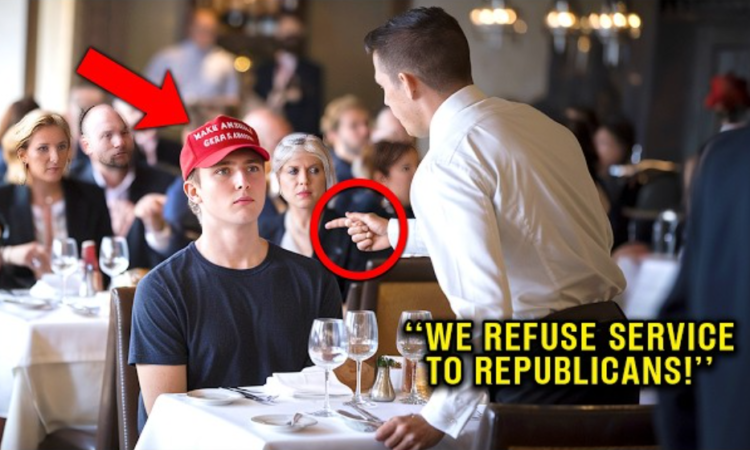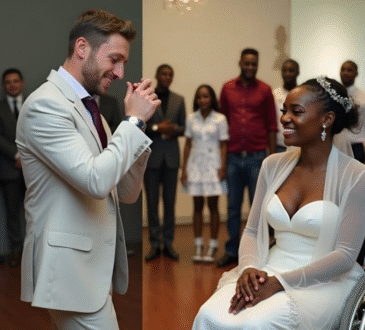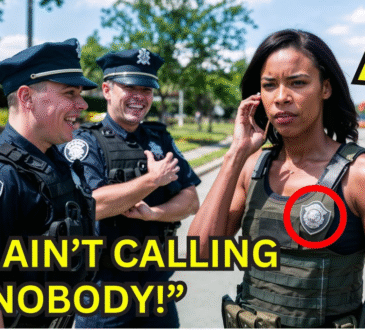Waiter Insulted Barron Trump In A Luxury Restaurant, But When He Discovered The Truth You Won’t

A young waiter thought he was making a bold statement when he insulted a teen wearing a MAGA hat, but when he found out it was Barron Trump, the night took a turn he never saw coming. The dim glow of chandeliers bounced softly off the polished marble floors of the Arcadian Table, a prestigious restaurant nestled in the heart of Beverly Hills.
The air was rich with the aroma of aged wine and truffle oil, a quiet murmur of conversations weaving through the space. It was the kind of place where luxury wasn’t flaunted, but simply existed effortlessly.
Ethan, a young waiter in his late 20s, moved briskly between tables, his crisp white shirt already showing signs of the busy evening. He had worked here long enough to recognize most of the regulars—film producers, fashion icons, and business moguls—but tonight, one particular table caught his eye. In the far corner, a teenage boy sat beside an older man.
The boy couldn’t have been older than 16—tall and gangly, with an air of quiet confidence. But what truly stood out was the bright red MAGA hat perched on his head, glaringly out of place amidst the understated elegance of the room. Ethan felt a twinge of irritation; that hat was a statement, and not one he particularly cared for. His coworkers often joked about his fiery opinions, and tonight, the presence of that hat stirred something in him.
“Figures,” he muttered under his breath as he grabbed a water pitcher and headed toward the table. As he approached, the older gentleman glanced up and offered a polite nod of acknowledgment. The boy, however, barely looked up, his gaze fixed on his phone. Ethan set the water glasses down with a bit more force than necessary, the sound punctuating the surrounding quiet.
“What can I get for you tonight?” he asked, his tone sharp. Before the man could respond, Ethan added, “Or does he,” he gestured vaguely toward the boy, “prefer to be served somewhere else, given the hat and all?”
The room seemed to hold its breath. The boy slowly raised his head, his face unreadable. He didn’t respond; instead, he gave a small, almost imperceptible nod toward the older man, who placed their order without addressing the comment. Ethan walked away, his chest tight with a mix of satisfaction and unease. He had made his point, but the boy’s silence had unnerved him. He couldn’t shake the feeling that something about the interaction had shifted the atmosphere of the entire room.
But just as Ethan started to relax, the restaurant manager appeared at his side, his expression grim, and whispered something that made Ethan’s heart drop. Ethan felt the blood drain from his face as the manager’s words sank in.
“That boy is Barron Trump,” he whispered, his tone carrying a weight of urgency. “And the gentleman with him is Senator Alden Royce. They’re here after a high-profile charity event.”
“What were you thinking?” The manager’s glare was sharp, his lips pressed into a thin line.
Ethan stammered, “I didn’t… How was I supposed to know?”
His voice was low but defensive, though the knot in his stomach tightened. He looked back at the corner table where Barron sat quietly, seemingly unfazed, while the senator engaged him in a low conversation.
“You have no idea the kind of trouble this could bring,” the manager hissed before walking away, leaving Ethan standing by the drink station, his heart pounding. He could still feel the weight of the room’s attention. It was subtle—stolen glances, a shift in the ambiance—but it was enough to make him painfully aware of his mistake. He replayed the moment in his head—the hat, the comment, the silence. Barron’s expression had been impossible to read, but there had been no outrage, no immediate retaliation. That fact alone gnawed at Ethan’s nerves.
As the night continued, Ethan couldn’t help but steal glances at the table. The senator seemed at ease, occasionally leaning in to share something that elicited a small, polite smile from Barron. The boy’s demeanor was calm, composed even, and it unnerved Ethan more than anger would have. Finally, the senator motioned for the bill. Ethan hesitated, his feet rooted to the floor, but the manager’s sharp nod signaled him to move.
As he approached the table, the senator looked up with a faint smile.
“Thank you for your service tonight,” he said, his voice courteous but firm, a slight edge of disapproval laced within.
Ethan’s gaze flicked to Barron, who met his eyes for the first time. The boy’s face was calm, but there was something in his expression—a quiet strength, a refusal to be shaken—that made Ethan’s stomach twist. He fumbled with the bill, mumbling an apology that sounded hollow even to his own ears. Barron didn’t say a word. He simply stood, placed the hat back on his head, and followed the senator out the door.
The silence they left behind was deafening. But just as Ethan thought the ordeal was over, one of the diners at the next table leaned over and said, “I hope you realize what you just did will be all over social media by morning.”
Ethan’s stomach sank as he processed the diner’s words. Social media. His mind raced with worst-case scenarios—tweets, videos, headlines accusing him of insulting a teenager. And not just any teenager, but Barron Trump. He glanced at the other tables, now keenly aware of phones discreetly angled in his direction. He darted into the kitchen, his hands shaking as he pulled out his own phone. A quick search confirmed his fears. The first post had already gone up: “Waiter insults Barron Trump over MAGA hat at the Arcadian Table. Unreal.” The photo attached showed him mid-sentence, his face contorted in what could only be described as anger.
“Ethan, what the hell were you thinking?” the manager barked, storming into the kitchen. “Do you have any idea how bad this could get for us, for you?”
“I didn’t mean—” Ethan started, but the manager cut him off.
“You didn’t mean? You think that matters now? This is a PR nightmare. The Trumps have connections that could shut this place down in a heartbeat.” He paused, rubbing his temples as if trying to stave off a headache. “You’re on thin ice. Apologize if there’s a chance they’ll listen. Otherwise, pray this blows over.”
Ethan nodded numbly, the weight of his mistake pressing heavily on his chest. He wanted to believe the comment had been harmless—a throwaway line driven by his irritation at the hat—but now it felt much bigger, like he had crossed an unspoken line he hadn’t even realized existed. The night dragged on, each table he served feeling like a gauntlet. When the restaurant finally emptied, Ethan sat alone in the staff room, scrolling through the escalating online chatter. The comments were brutal. Some labeled him as a hero for standing up to privilege, while others called for his firing, accusing him of bullying a kid for his family’s politics. The polarizing nature of the reaction stunned him. It wasn’t just about a hat anymore; it was about what the hat symbolized to people. And Ethan realized with a sinking heart that he had underestimated the power of perception.
As he sat there, a private message popped up on his phone. It was from an unfamiliar number, but the sender’s name made him freeze: Alden Royce. The message was brief: “Meet me tomorrow at 11 a.m. The boy deserves to be heard.”
Ethan stared at the screen, the weight of those words settling over him. He had expected backlash, maybe even legal threats, but not this—a direct invitation to confront the situation head-on. But as he tried to imagine what Barron might have to say, a new wave of dread washed over him. What if this meeting was less about understanding and more about accountability?
The next morning, Ethan arrived at the Arcadian Table an hour early, his nerves frayed. The restaurant felt eerily quiet without the usual hum of diners and staff. He paced the dining room, rehearsing possible apologies, but every version felt insincere or inadequate. What could he possibly say to make up for what he’d done?
At exactly 11 a.m., the door opened, and Senator Alden Royce stepped in, followed closely by Barron Trump. Ethan’s breath caught in his throat. Barron looked just as composed as the night before, his MAGA hat absent now, his blond hair neatly combed. The senator gestured for them to sit at a table near the window, and Ethan hesitated before joining them. The senator wasted no time.
“I won’t mince words, Ethan. What you said last night was inappropriate, but I believe in handling things face-to-face rather than through headlines or lawsuits.”
Ethan nodded quickly, his mouth dry. “I’m so sorry,” he began, his voice cracking. “I didn’t mean to insult anyone. I just…” He stopped, realizing excuses wouldn’t help. “It was wrong. I let my personal feelings get in the way of my professionalism.”
Alden nodded but said nothing, his gaze steady. Then, to Ethan’s surprise, Barron spoke.
“You’re not the first person to make a comment like that,” he said, his tone calm but firm, “and you won’t be the last. People see the hat and they think they know everything about me. They don’t see me.”
Ethan blinked, stunned by the maturity in the teenager’s words. “I… I didn’t think about that,” he admitted.
“I just reacted,” Barron continued. “It’s not just about the hat though, is it? It’s about what you think it stands for. But here’s the thing: you don’t know why I wore it. You didn’t ask.”
The room felt heavy with the weight of Barron’s words. Ethan hadn’t considered the boy’s perspective, hadn’t thought to wonder if there was more to the story. He had let his assumptions guide his actions, and now he could see the damage they had caused.
“I judged you,” Ethan said quietly, his voice filled with regret. “I judged you without knowing anything about you. That wasn’t fair.”
Barron tilted his head slightly, studying him. “Why do you think you did it?”
Ethan hesitated, caught off guard by the question. “I guess I’ve been frustrated with everything going on in the world. Sometimes it feels like we’re all just shouting at each other, trying to prove who’s right, instead of actually listening.” He looked down at his hands, ashamed. “But that doesn’t excuse what I did.”
The senator finally spoke again, his voice measured. “It doesn’t excuse it, no. But recognizing your bias is the first step toward doing better. Barron has had to learn that too. Being who he is, he’s faced plenty of assumptions from people who don’t bother to see him as a person.”
Barron nodded, his eyes steady on Ethan. “I get it. People assume things about you all the time. But here’s the thing: when you hurt someone, you can’t just say ‘sorry’ and move on. You have to ask yourself how you can be better. Not for me, for you.”
Ethan felt the words settle deep in his chest, a mix of shame and determination rising within him. Barron’s composure and insight had completely disarmed him, turning what could have been a confrontation into an unexpected moment of reflection.
But just as Ethan began to feel a sense of relief, Barron added, “And sometimes the hardest part is realizing that no matter how much you want to fix it, some people will still only see the mistake.”
Ethan sat in stunned silence, Barron’s words cutting deeper than any reprimand could. He wanted to respond, to prove that he could do better, but he knew this wasn’t about quick fixes. It was about facing the truth of his actions and their consequences.
The senator glanced at Barron, then back at Ethan. “You have an opportunity here, Ethan,” he said. “It’s not often people get the chance to face their mistakes directly and grow from them. The question is: what will you do with it?”
Before Ethan could answer, Barron leaned back in his chair, a thoughtful expression on his face. “You know,” he said slowly, “I didn’t even want to wear the hat last night. My dad insisted, said it was about standing for something no matter how uncomfortable it made me. But all it’s done is make people think I’m something I’m not.”
Ethan’s chest tightened. “I’m sorry,” he said again, his voice soft but earnest. “I didn’t think about how it might feel for you. I saw the hat and I made assumptions. I was wrong.”
Barron nodded slightly, his expression unreadable. “It’s not just you. A lot of people do it. They see a hat, a shirt, a sign, and they think it tells the whole story. But it doesn’t. It’s just one piece.”
The senator interjected, his tone gentle but firm. “We all need to be better about looking past surface-level differences, Ethan. Last night was a lesson for you, for Barron, for all of us. Now it’s about what you take from it.”
Ethan felt a lump rise in his throat. “I want to do better,” he said quietly, not just for this situation but for myself. “I don’t want to be someone who judges people without knowing them.”
The room fell quiet for a moment, the weight of the conversation settling over them. Then, unexpectedly, Barron smiled, just a small genuine curve of his lips.
“That’s a good start,” he said.
The senator stood, signaling the end of the meeting. As Barron rose to follow, he turned to Ethan one last time.
“You’re going to have to live with this mistake,” he said. “But how you move forward will show what kind of person you really are. Just don’t let it stop at words.”
Ethan nodded, his heart heavy but resolute. He watched as they left the restaurant, their figures silhouetted against the bright midday sun. But even as the door closed behind them, Ethan knew this wasn’t the end. It was the beginning of a long, difficult journey to becoming a better version of himself.
The restaurant felt strangely quiet after they left, as if the gravity of the encounter had left its mark on the air. Ethan sat at the table for a few moments longer, staring at the empty seat where Barron had been. His mind replayed the boy’s calm, measured words—the surprising grace he’d shown despite everything.
When the manager entered the dining room, his expression was softer than Ethan had expected. “How did it go?” he asked, his tone weary.
Ethan took a deep breath. “It went better than I deserved,” he glanced at the clock on the wall. The meeting had lasted less than an hour, but it felt like it had changed something in him. “They didn’t want anything. No compensation, no public apology. They just wanted me to understand.”
The manager nodded, crossing his arms. “And do you?”
Ethan met his eyes. “I do. It wasn’t just about the comment I made. It was about the kind of person I was in that moment. I don’t want to be that person anymore.”
The manager regarded him for a moment before clapping a hand on his shoulder. “Good. Then prove it, not just here, but out there.” He gestured to the world beyond the restaurant doors. “We all make mistakes, Ethan. What matters is what we do after.”
As the day wore on, Ethan couldn’t stop thinking about the senator’s words or Barron’s. He decided to take action, not out of guilt, but out of a genuine desire to grow. He signed up for a local community workshop on unconscious bias and committed to having conversations with people from different walks of life. It wasn’t easy, and it wasn’t instant, but step by step, he began to see the world differently.
Months later, Ethan found himself serving another table at the Arcadian Table. A guest complimented his attentive service, and he realized something had changed—not in his circumstances, but in himself. He no longer saw people as symbols or assumptions. He saw them as individuals, each with their own story.
As he cleared the table, a familiar voice drifted through his mind. “How you move forward will show what kind of person you really are.” He smiled to himself, grateful for the hard lesson he’d learned. Life often puts us in situations that force us to confront our biases and grow beyond them. It’s not about avoiding mistakes; it’s about learning from them.




